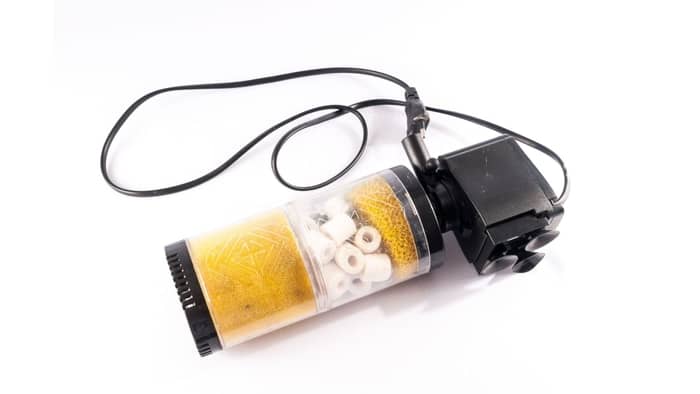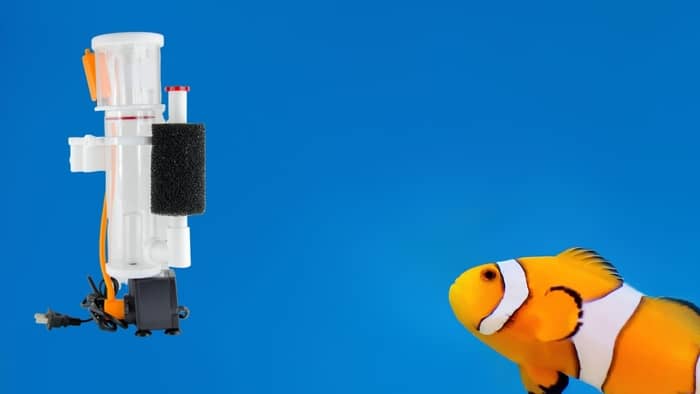Last Updated on September 16, 2021 by admins
Having saltwater fish is a lot of work, so it is important to have a proper saltwater aquarium filter setup. It is vital to provide a healthy environment for your fish in order for them to strive. Having the right filter can make all the difference for the health of your fish.
Saltwater fish require a lot of responsibility. They need just the right setup in order to survive. With the right research, you can ensure that you have created a healthy habitat with a saltwater aquarium filter setup.
Types Of Saltwater Aquarium Filters Setup.
There are several different types of filters you can use for your saltwater aquarium. Each of them has their own advantages. Some aquariums will even use a sump in addition to a filtration system.
Mechanical Filters
Mechanical filters are the most straightforward type of filter. It works to filter out waste and debris from the water. Though it is popular for freshwater tanks, it is not as popular for saltwater tanks, however, some people do opt for them.
The water in mechanical filters strains through paper, pads, sponges, or floss. It does not remove algae, bacteria, or dissolved waste.
Biological Filters
Biological filters are the most important type of filters for a saltwater tank. Unlike mechanical or chemical filters which have actual systems, a biological filter is made up of nitrifying bacteria. The nitrifying bacteria is a living entity that breaks down waste in fish tanks.
It works to break down harmful elements such as ammonia into nitrite and then breaks that down into the less harmful nitrate. It will typically take between four to six weeks for the biological filter to begin working in the fish tank. The most common type of biological filter is live rock.
Chemical Filters
Chemical filters often time use activated or regular charcoal to rid aquariums of dissolved impurities. In addition to removing all toxins from the water, it also works to remove heavy metals and chlorine.
Chemical filters need to be changed every three to four weeks. As they become saturated, they become less effective. In addition, if you are medicating your tank you will need to remove the chemical filter so it doesn’t remove the medicine from the tank.
Under Gravel Filters
Under gravel, filters sit at the bottom of the tank and pull water down through the substrate. Particles then get trapped in the media as the water passes through, with the surface area acting as the biological filter.
They operate by an air pump and air stones. Many people find that they are outdated and not the best option.
Canister Filters
Canister filters are a versatile style of filter. They are compact, multi-purpose, can run continuously, or can also be added whenever you need it. You can use the filter on its own or with another filter.
Canister filters are powerful and are a great choice for large saltwater aquariums. They provide mechanical, chemical, and biological filtration. You can place the canister inside or under the fish tank.
Protein Skimmers
Protein skimmers are a great option as a saltwater aquarium filtration setup. As a mechanical filter system, it uses air bubbles for the filtration system. The bubbles remove organic compounds by bringing the waste to the surface.
The foam that is produced from the process is deposited into an enclosed compartment. It is a popular filtration method for aquariums with reefs.
Learn more about: How To Reduce Nitrites In An Aquarium
Sump Aquarium Filters
The best option for your aquarium is to use a sump-based system. The sump is often located underneath the tank in the cabinet. It typically includes a protein skimmer, filter sponge, and substrate reactors.
The water diverts from the tank into the sump and then back into the tank. While in the sump, the water gets filtered. Sumps are effective filters, however, they require additional parts.
When money is not an issue, they are the best choice you can go for. They effectively clean the water to keep it fresh.
Trickle Filters
A trickle filter is a great addition to your saltwater aquarium. The filters can be customizable to maintain the environment of your tank with additional equipment and a sump.
Though adding a trickle filter with a sump can be a lot of work, once it is all ready to go, it is practically self-sufficient. The trickle filter can be located below the tank in a cabinet.
For biological filtration, it uses organic filter media including bio balls or floss. Water trickles over the media and creates an air-to-water surface which attracts debris to the media. The addition of chemical filtration media works to remove solid waste.
The Right Saltwater Aquarium Filter Setup
Having a saltwater aquarium can be an amazing addition to your home. It gives you the ability to own a variety of incredible fish and plant life. However, if you own a fish tank, it is vital you provide proper care to maintain it.
One of the most important aspects of a saltwater aquarium is the filter system. A properly working filter system will help keep your tank clean and also create a healthy environment. A filter system is not something you can skip out on and it is important you have a good one.
Fortunately, there are many different filter systems you can choose from. They include chemical, biological and mechanical. Within those categories, there are other types as well, each that works to rid your aquarium of organic waste.
No matter the filter you use, it is important that you properly install and maintain it. This will ensure the saltwater aquarium filter system is working correctly to create a safe habitat for your fish and plant life. Some aquariums will even come with filters that are already set up in the tank, helping save you work.
Do you have any questions on saltwater aquarium filter setups? If so, please ask any questions you have on saltwater filtration systems in the comment section down below.
Read more about: Saltwater Sharks For Home Aquariums


Leave a Reply
You must be logged in to post a comment.